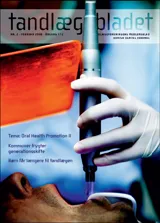Brug af tandplejesystemet og egenomsorg i Danmark
Brug af tandplejesystemet og egenomsorg er betydelige faktorer i den sundhedsfremmende indsats i tandplejen. Formålet med denne oversigtsartikel er at beskrive den danske befolknings brug af tandplejesystemet og mundhygiejnevaner samt at belyse, hvorledes denne adfærd har udviklet sig over tid set i et sociokulturelt perspektiv. Den overordnede målsætning for tandplejen i år 2000 er delvis opfyldt i kraft af den forbedrede tandstatus generelt i befolkningen. Størstedelen af befolkningen bruger tandplejen regelmæssigt, men manglende brug af forebyggende tandpleje har fortsat en social gradient. En fremtidig sundhedsfremmende indsats på tandplejeområdet bør rettes specifikt mod samfundets svage grupper. Mulighed for at overvåge udviklingen af de orale sygdomme i befolkningen kunne medvirke til at målrette og evaluere den sundhedsfremmende indsats.
The aim of this review paper is to describe utilization of the dental care system and oral self-care practices among Danish citizens. All children and adolescents have access to free-of-charge preventive and curative dental care offered by school-based outreaching public dental health services. Almost 100% of the target group participates in this programme. The adult population is offered dental care by dentists in private practice, which is partly paid by the National Health Insurance (NHI). The reimbursement scheme of the NHI gives priority to preventive dental visits as well as to dental services that include oral hygiene instructions and counselling on diet and use of tobacco. In the last thirty years there has been an increase in the proportion of Danes who make regular dental visits and there has also been some enhancement of oral hygiene habits in terms of tooth brushing, use of toothpicks and dental floss. However, there are still population groups who do not use the dental care system regularly and who do not benefit from preventive dental care, in particular, disadvantaged older people. This inequity among those with poor living conditions and poor dental care habits has a social gradient. In future, oral health promotion should be directed specifically to these underprivileged groups. Tools are recommended for evaluating oral health activities directed towards reducing the burden of oral diseases, especially in relation to dental caries, periodontal disease and lesions of the oral mucosa.


